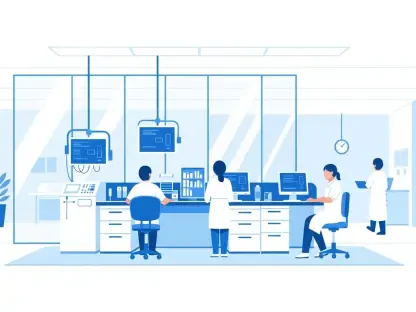In a world where nearly half of women report feeling dismissed or unheard by healthcare providers, a California-based startup is stepping up to change the narrative with innovative technology. Imagine a late-night worry about a pregnancy symptom—there’s no need to wait for office hours or sift through endless online forums, as with just a few taps on a phone, an answer emerges, tailored and immediate. Millie, a women’s health innovator, is making this scenario a reality through its AI agent, Maia, offering a lifeline to thousands navigating the often complex landscape of maternal and gynecological care. This isn’t just a tech gimmick; it’s a bold step toward closing long-standing gaps in access and understanding.
Why Should You Care About AI in Women’s Health?
The stakes in women’s health are high—studies reveal that over 60% of women in the United States face challenges accessing specialized care, particularly in rural or underserved areas. OB-GYN shortages compound the issue, leaving many without timely support during critical moments like pregnancy or menopause. Millie’s introduction of AI through Maia addresses this by providing 24/7 access to information and guidance, a game-changer for those who can’t afford to wait.
Beyond accessibility, AI offers a level of personalization that traditional systems often lack. Maia doesn’t just spit out generic responses; it learns from each interaction, adapting to a patient’s history and needs. For the 2,500 patients Millie has already served, this means less frustration and more confidence in managing their health.
This technology also signals a shift in how healthcare meets modern expectations. Younger generations, accustomed to instant digital solutions, demand seamless experiences, and Millie’s hybrid model of in-person and virtual care, powered by AI, is poised to meet that demand head-on, reshaping perceptions of what healthcare can be.
The Bigger Picture: Challenges in Women’s Health and the Rise of AI
Systemic barriers in women’s health extend far beyond provider shortages. Fragmented data systems and outdated infrastructure often delay critical insights, leaving patients and clinicians struggling to keep up. Millie, established just a few years ago, recognized these inefficiencies early and built a foundation to tackle them, integrating AI as a core component of its strategy to streamline care delivery.
The rise of AI in healthcare isn’t merely a trend—it’s a response to a growing crisis. With demand for women’s health services projected to increase by 20% over the next decade, tools like Maia help bridge the gap by handling non-clinical tasks, freeing human providers for complex cases. This synergy between technology and human expertise is becoming a cornerstone of innovative care models.
Millie’s approach also reflects a broader industry pivot toward patient-centric solutions. By combining virtual support with physical clinics, the startup addresses both immediate needs and long-term care, ensuring women aren’t left navigating a maze of disconnected services. This holistic vision sets a new standard in a field desperate for change.
Breaking Down Millie’s Game-Changing Approach with Maia
At the heart of Millie’s innovation lies Maia, an AI agent embedded in a mobile app, designed to act as a constant companion for patients. Available around the clock, Maia handles everything from answering basic questions about prenatal vitamins to scheduling appointments and sending personalized reminders. Its ability to recall past interactions ensures each exchange feels uniquely relevant, a feature that has resonated deeply with users.
Safety remains paramount in this tech-driven model. When faced with clinical inquiries, Maia doesn’t overstep—it promptly escalates these to Millie’s human clinical team. This careful balance ensures that while efficiency is maximized, the integrity of medical advice is never compromised, setting a benchmark for responsible AI use in healthcare.
Behind the scenes, Millie’s technological edge shines through a unified data platform launched recently, integrating electronic health records, lab results, and scheduling into one AI-ready system. Unlike traditional health systems bogged down by siloed data, this setup allows real-time analysis and scalability, enabling both patients and providers to benefit from sharper, faster insights. Additionally, AI tools support clinicians with documentation and risk detection, while business teams leverage analytics to optimize operations, proving that innovation can elevate every facet of care.
Voices from the Frontline: Insights and Impact
Leadership at Millie underscores the transformative intent behind their AI strategy. Founder and CEO Anu Sharma has articulated a clear vision, noting, “Technology is a powerful ally, but it must always enhance, not replace, the human touch in clinical care.” This philosophy guides the startup’s cautious yet ambitious integration of tools like Maia into everyday patient interactions.
Senior Vice President of Product and Technology, Chase Schwalbach, highlights the structural advantage of their system, stating, “A unified data backbone isn’t just infrastructure—it’s what lets us deliver care that feels personal, even at scale.” This perspective mirrors industry recognition that seamless data flow is critical to unlocking AI’s full potential in health settings.
Patient stories bring the impact to life. One user recounted how Maia’s late-night nudge about a prenatal checkup prevented a missed critical visit, a small but profound example of how constant support can alter outcomes. Such experiences illustrate not just convenience, but a deeper sense of being cared for, a sentiment echoed across Millie’s growing community of patients.
Practical Takeaways: How Millie’s Model Could Shape Your Care
Navigating women’s health can feel overwhelming, but Millie’s model offers concrete strategies to ease the journey. Start by exploring health apps with AI capabilities similar to Maia for managing routine tasks like reminders or basic queries, freeing up mental space for more pressing concerns. This simple step can transform daily health management.
Understanding the boundaries of technology is equally vital. If a health issue feels intricate or urgent, always push for direct input from a human provider, mirroring Millie’s protocol of escalating clinical matters. This ensures safety isn’t sacrificed for speed, a principle worth adopting in any tech-reliant care setting.
Finally, consider seeking out hybrid care providers that blend virtual and in-person services, especially if local access to specialists is limited. With Millie expanding through partnerships with major health systems like Sutter Health, this model is becoming more accessible, offering a blueprint for personalized care that adapts to individual histories and preferences. Advocating for such tailored solutions from any provider can elevate the quality of attention received.
Reflecting on a Health Revolution
Looking back, Millie’s journey with Maia marked a pivotal moment in women’s health, proving that AI could be more than a buzzword—it became a bridge to better access and understanding. The startup’s commitment to blending technology with human oversight redefined expectations, showing that care could be both immediate and deeply personal. Its expansion and partnerships underscored a scalable solution to systemic shortages, leaving an indelible impact on how patients and providers interacted.
As the landscape continued to evolve, the lessons from Millie’s approach lingered as a guidepost. Patients were encouraged to demand tech-enabled, customized care from their providers, while health systems took note of the power in unified data and hybrid models. The path ahead invited exploration of similar innovations, urging all stakeholders to prioritize accessibility and empathy in every advancement, ensuring that no woman’s health concern went unheard.









